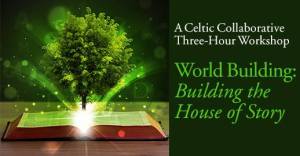World building (generally associated with science fiction and fantasy) is essential for all writers. Whether you’re writing memoir, crime fiction, or romance, your world should come to life for the reader. Think of your world as another character. Good characters have flaws that make them more human and attractive to readers. Here’s why story world flaws are necessary:
- If your world isn’t out of whack, you might not have a story. Story world flaws spring from imbalance, instability, or corruption (also referred to as the chaos factor). In The Hunger Games by Suzanne Collins, the citizens of Panem’s outer districts live in poverty while the people inside the capital live in splendor. The imbalance of power among its citizens eventually leads to rebellion and revolution.
- World flaws create conflict and tension. As punishment for a past rebellion, the government of Panem has instituted a lottery system called the Reaping. Each year, citizens are selected from the Reaping to participate in a televised death match called the Hunger Games.
- Faults create dilemmas that must be solved. Prim, the younger sister of Katniss, is selected as a participant in the Hunger Games. To save Prim’s life, Katniss takes her younger sister’s place in the Hunger Games, creating a life-or-death dilemma for herself.
- Weaknesses can stem from anything, even natural resources. Story world flaws can stem from problems such as discrimination, persecution, censorship, and genocide. Weaknesses can also originate from situations like natural resources and who controls them. Below is the Amazon.com write-up for Salt: A World History:
“In his fifth work of nonfiction, Mark Kurlansky turns his attention to a common household item with a long and intriguing history: salt. The only rock we eat, salt has shaped civilization from the very beginning, and its story is a glittering, often surprising part of the history of humankind. A substance so valuable it served as currency, salt has influenced the establishment of trade routes and cities, provoked and financed wars, secured empires, and inspired revolutions.”
Bet you’ll never look at salt the same way again.
- The story world and its inhabitants should react with credible response to the chaos effect. It’s hard for readers to suspend disbelief when they don’t feel grounded in your story. Your characters should respond appropriately to the flaws in their world. We’ve all watched movies where the character’s over-the-top reactions have killed our suspension of disbelief. Writers, don’t let this happen to you.
Interested in World Building? I’ll be teaching a class for those who are currently writing or have an idea for a story. We’ll discuss novels in which the story world springs to life for the reader. Participants will leave class with a story bible template to commence or complete their story world. Email mork.jessica@gmail.com to register. More information at https://www.facebook.com/events/1159186177535739/?ti=icl


This is great. I guess I have never given much thought to my world…maybe that is why I haven’t finished my novel yet. Thanks for sharing this!
LikeLike
Don’t let your world stop you from finishing your book! I’m still working on mine, too.
LikeLike